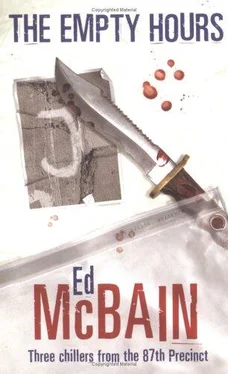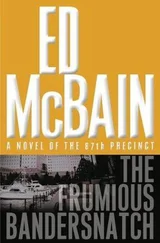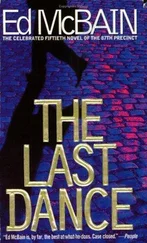Ed McBain - The Empty Hours
Здесь есть возможность читать онлайн «Ed McBain - The Empty Hours» весь текст электронной книги совершенно бесплатно (целиком полную версию без сокращений). В некоторых случаях можно слушать аудио, скачать через торрент в формате fb2 и присутствует краткое содержание. Жанр: Политический детектив, на английском языке. Описание произведения, (предисловие) а так же отзывы посетителей доступны на портале библиотеки ЛибКат.
- Название:The Empty Hours
- Автор:
- Жанр:
- Год:неизвестен
- ISBN:нет данных
- Рейтинг книги:3 / 5. Голосов: 1
-
Избранное:Добавить в избранное
- Отзывы:
-
Ваша оценка:
- 60
- 1
- 2
- 3
- 4
- 5
The Empty Hours: краткое содержание, описание и аннотация
Предлагаем к чтению аннотацию, описание, краткое содержание или предисловие (зависит от того, что написал сам автор книги «The Empty Hours»). Если вы не нашли необходимую информацию о книге — напишите в комментариях, мы постараемся отыскать её.
The Empty Hours — читать онлайн бесплатно полную книгу (весь текст) целиком
Ниже представлен текст книги, разбитый по страницам. Система сохранения места последней прочитанной страницы, позволяет с удобством читать онлайн бесплатно книгу «The Empty Hours», без необходимости каждый раз заново искать на чём Вы остановились. Поставьте закладку, и сможете в любой момент перейти на страницу, на которой закончили чтение.
Интервал:
Закладка:
Why? he asked himself.
Where is the logic?
There was none. No logic in the choice of the victims, and no logic in the choice of the scene. Why would anyone have chosen to kill Helga in broad daylight, on a chair suspended anywhere from six to thirty feet above the ground, using a ski pole as a weapon? A ski pole sharpened to a deadly point, Hawes reminded himself, don’t forget that. This thing didn’t just happen, this was no spur-of-the-moment impulse, this was planned and premeditated, a pure and simple Murder One. Somebody had been in that ski shop the night before the first murder, using a file and then a grinding wheel, sharpening that damn pole, making certain its end could penetrate a heavy ski parka, and a ski sweater, and a heart.
Then there must have been logic to the choice of locale, Hawes thought. Whoever killed Helga had at least planned far enough ahead to have prepared a weapon the night before. And admitting the existence of a plan, then logic could be presupposed, and it could further be assumed that killing her on the chair lift was a part of the plan — perhaps a very necessary part of it.
Yes, that’s logic, he thought— except that it’s illogical.
Behind him, Blanche stirred. He turned to look at her briefly, remembering the horror on her face last night, contrasting it now with her features relaxed in sleep. She had told the story to Watt three times, had told him again and again how she’d found the dead girl.
Maria Fiers, twenty-one years old, brunette, a native of Montpelier, Vermont. She had begun skiing when she was six years old, had won the woman’s slalom four times running, had been an instructor since she was seventeen. She skated, too, and had been on her high school swimming team, an all-around athlete, a nice girl with a gentle manner and a pleasant smile — dead.
Why?
She lived in the room next door to Helga’s, had known Helga for close to a year. She had been nowhere near the chair lift on the day Helga was killed. In fact, she had been teaching a beginner’s class near the T-Bar, a good distance from the chair lift. She could not have seen Helga’s murder, nor Helga’s murderer.
But someone had killed her nonetheless.
And if there were a plan, and if there were supposed logic to the plan, and if killing Helga on a chair halfway up the mountain was part of that logic, then the death of Maria Fiers was also a part of it.
But how?
The hell with it, Hawes thought. I can’t think straight any more. I want to crack this so badly that I can’t think straight, and that makes me worse than useless. So the thing to do is to get out of here, wake Blanche and tell her to dress and pack, and then pay my bill and get out, back to the city, back to the 87th where death comes more frequently perhaps, and just as brutally — but not as a surprise. I’ll leave this to Theodore Watt, the sheriff who wants to make his own mistakes. I’ll leave it to him and his nimble-fingered deputies, and maybe they’ll bust it wide open, or maybe they won’t, but it’s too much for me, I can’t think straight any more.
He went to the bed and woke Blanche, and then he walked over to the main building, anxious to pay his bill and get on his way. Someone was at the piano, practicing scales. Hawes walked past the piano and the fireplace and around the corner to Wollender’s office. He knocked on the door, and waited. There was a slight hesitation on the other side of the door, and then Wollender said, “Yes, come in,” and Hawes turned the knob.
Everything looked exactly the way it had looked when Hawes checked in on Friday night, an eternity ago. Wollender was sitting behind his desk, a man in his late twenties with dark hair and dark brows pulled low over deep brown eyes. He was wearing a white shirt open at the throaty a bold reindeer-imprinted sweater over it. The plaster cast was still on his right leg, the leg stretched out stiffly in front of him, the foot resting on a low ottoman. Everything looked exactly the same.
“I want to pay my bill,” Hawes said. “We’re checking out.”
He stood just inside the door, some fifteen feet from the desk. Wollender’s crutches leaned against the wall near the door. There was a smile on Wollender’s face as he said, “Certainly,” and then opened the bottom drawer of the desk and took out his register and carefully made out a bill. Hawes walked to the desk, added the bill, and then wrote a check. As he waved it in the air to dry the ink, he said, “What were you doing in my room yesterday, Mr. Wollender?”
“Checking the heat,” Wollender said.
Hawes nodded. “Here’s your check. Will you mark this bill ‘Paid,’ please?”
“Be happy to,” Wollender said. He stamped the bill and handed it back to Hawes. For a moment, Hawes had the oddest feeling that something was wrong. The knowledge pushed itself into his mind in the form of an absurd caption: WHAT’S WRONG WITH THIS PICTURE? He looked at Wollender, at his hair, and his eyes, and his white shirt, and his reindeer sweater, and his extended leg, and the cast on it, and the ottoman. Something was different. This was not the room, not the picture as it had been on Friday night. WHAT’S WRONG WITH THIS PICTURE? he thought, and he did not know.
He took the bill. “Thanks,” he said. “Have you heard any news about the roads?”
“They’re open all the way to the Thruway. You shouldn’t have any trouble.”
“Thanks,” Hawes said. He hesitated, staring at Wollender. “My room’s right over the ski shop, you know,” he said.
“Yes, I know that.”
“Do you have a key to the shop, Mr. Wollender?”
Wollender shook his head. “No. The shop is privately owned. It doesn’t belong to the hotel. I believe the proprietor allows the ski instructors to ...”
“But then, you’re a locksmith, aren’t you?”
“What?”
“Isn’t that what you told me when I checked in? You said you were a locksmith out of season, didn’t you?”
“Oh. Oh, yes. Yes, I did.” Wollender shifted uneasily in the chair, trying to make his leg comfortable. Hawes looked at the leg again, and then he thought, Damn it, what’s wrong?
“Maybe you went to my room to listen, Mr. Wollender. Is that possible?”
“Listen to what?”
“To the sounds coming from the ski shop below,” Hawes said.
“Are the sounds that interesting?”
“In the middle of the night, they are. You can hear all sorts of things in the middle of the night. I’m just beginning to remember all the things I heard.”
“Oh? What did you hear?”
“I heard the oil burner clicking, and the toilet flushing, and the Cats going up the mountain, and someone arguing down the hall, and somebody filing and grinding in the ski shop.” He was speaking to Wollender, but not really speaking to him. He was, instead, remembering those midnight voices raised in anger, and remembering that it was only later he had heard the noises in the shop, and gone to the window, and seen the light burning below. And then a curious thing happened. Instead of calling him “Mr. Wollender,” he suddenly called him “Elmer.”
“Elmer,” he said, “something’s just occurred to me.”
Elmer. And with the word, something new came into the room. With the word, he was suddenly transported back to the interrogation room at the 87th, where common thieves and criminals were called by their first names, Charlie, and Harry, and Martin, and Joe, and where this familiarity somehow put them on the defensive, somehow rattled them and made them know their questioners weren’t playing games.
“Elmer,” he said, leaning over the desk, “it’s just occurred to me that since Maria couldn’t have seen anything on the mountain, maybe she was killed because she heard something. And maybe what she heard was the same arguing I heard. Only her room is right next door to Helga’s. And maybe she knew who was arguing.” He hesitated. “That’s pretty logical, don’t you think, Elmer?”
Читать дальшеИнтервал:
Закладка:
Похожие книги на «The Empty Hours»
Представляем Вашему вниманию похожие книги на «The Empty Hours» списком для выбора. Мы отобрали схожую по названию и смыслу литературу в надежде предоставить читателям больше вариантов отыскать новые, интересные, ещё непрочитанные произведения.
Обсуждение, отзывы о книге «The Empty Hours» и просто собственные мнения читателей. Оставьте ваши комментарии, напишите, что Вы думаете о произведении, его смысле или главных героях. Укажите что конкретно понравилось, а что нет, и почему Вы так считаете.












